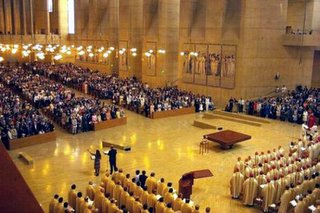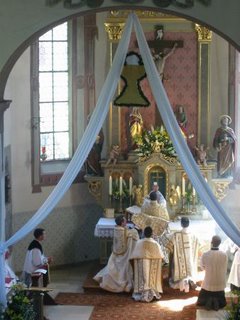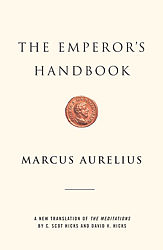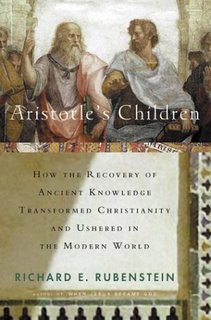Securus iudicat orbis terrarum?

The reality of today seems to be that "Could it be that modern man is so starving for authentic and correct worship that his impulse is to unearth the church's earlier treasures?" is wishful thinking on our part. Most people today have not the slightest inclination to seek for liturgical treasures, and the "smouldering flax" is nearly extinguished. People go to churches as they go to supermarkets - looking for the "best deal" as suits them. It is no longer realistic to expect people to go to their own parish as in times past. These differences of spiritual awareness and life would indicate the need for parishes and other places of worship where people will find what they are looking for. It would be interesting to see the results of establishing a parish that does everything in a "medieval" way, using one of the archaic rites like Sarum, or even the Tridentine Rite in a Renaissance or Baroque setting, and see if it would attract people and what sort of people.
from Fr. Anthony's Ramblings February 27th
Funny I should hop on the computer and find this post from Fr. Anthony's fine blog. Last Saturday evening, I went to my first modern Roman Catholic Mass in almost two years. Before that, I had really only attended them very sparsely since I was fifteen. True, I grew up in the modern rite and going back was very familiar to me. Nevertheless, I could not get over the feeling that this is not the way I believe now. I have either grown out of it or forgotten it.
It used to be that all these liturgical modernizations made me sick to my stomach. Now, with so much experience in these things under my belt, my feelings about modern Latin rite liturgy range from amusement at such banality to a sympathetic understanding of why these things are done now. I have since become quite dispassionate about them.
My liturgical experiences in the last ten years have ranged from quasi-silent old rite Latin Masses to all-night monastic Coptic vigils, and everything imaginable in between. I have become accustomed to the people facing the same direction to pray, incense, chant, and other actions that can be deemed "unpastoral". Does that mean that I am a liturgical eccentric, an antiquarian, or an elitist aesthetic snob? I am resigned to accept this, but I am not resigned to go back to the church experience of my childhood. Nor am I resigned to say that it is I who am in the wrong on these things.
Related to these things is my recent study of Newman's Apologia pro Vita Sua. My whole feeling while reading it was seeing, perhaps very faintly but still distinctly, that the modern Roman Catholic Church is looking more and more like the non-entity that Newman perceived the Anglican Church to be in the 19th century. Is the Catholic Church of today still a bastion of certainty in a world rife with subjectivism, or has it made its peace with modern liberalism hoping to at least slow down the revolution a little? Is the Catholic Church still alive with rites and devotions that extend back to apostolic times, or is it rather a keen and servile follower of the signs of the times? For me, the answers are not clear, but at least I feel I know where all of this is headed and it is not towards tradition.
"Securus iudicat orbis terrarum": the judgement of the world is certain. Am I just swimming against the current of the modernized Christian masses, trying to put out the flames of the Spirit that are leading the Church and the world into a new springtime? Will we "traditionalists" be forgotten like the ancient church of North Africa destroyed by barbarian hordes? Is the majority right, and we stubborn dinosaurs wrong?
My answer, very stubbornly but still in all humility, is no.















